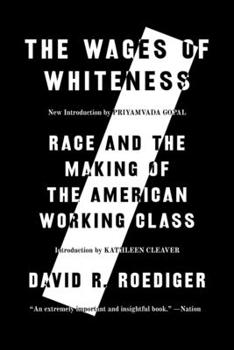The Wages of Whiteness: Race and the Making of the American Working Class
(Part of the The Haymarket Series Series)
Select Format
Select Condition 
Book Overview
Combining classical Marxism, psychoanalysis, and the new labor history pioneered by E. P. Thompson and Herbert Gutman, David Roediger's widely acclaimed book provides an original study of the formative years of working-class racism in the United States. This, he argues, cannot be explained simply with reference to economic advantage; rather, white working-class racism is underpinned by a complex series of psychological and ideological mechanisms that...
Format:Paperback
Language:English
ISBN:1839768304
ISBN13:9781839768309
Release Date:November 2022
Publisher:Verso
Length:240 Pages
Weight:0.50 lbs.
Dimensions:1.0" x 5.7" x 7.9"
Related Subjects
19th Century Americas Anthropology Business Business & Investing Cultural Discrimination & Racism Economic Conditions Economic History Economics Ethnic Studies Historical Study & Educational Resources History Humanities Labor & Industrial Relations Minority Studies Political Economy Politics & Government Politics & Social Sciences Race Relations Social History Social Science Social Sciences Specific Demographics TextbooksCustomer Reviews
3 ratings
A Necessary Read for all American Historians
Published by Thriftbooks.com User , 15 years ago
Let it be said from the outset that Roediger is an American Labor Historian, and although this is a book about race, it is also a book about the way class and race are so intertwined. I think it is somewhat amusing that so many people find Roediger racist against whites, I don't think he is: he is more interested in the way race and class became nearly unified concepts in the formation of the American Working Class during the nineteenth century. As Roediger points out, Working class became in many ways, white working class: which is no suprise considering that most works of labor history before the 1960s (and even most afterwards) concerned themselves only with white men. This of course leads to a minor fault in his work: gender is not fully considered (but at 180 pages, this is understandable). Dana Frank's "Purchasing Power" would be a good work to get a small glimpse of that peice of the puzzle. Overall, a great work of historical scholarship that should be read by every serious historian.
A Working Definition of Race
Published by Thriftbooks.com User , 23 years ago
David Roediger examines the growth and social construction of racism as it was related to the working classes of the ninteenth century. His scholarship earned him the Organization of American Historians Merle Curti Prize for US Social History in 1991. This work is brief, but dense in analysis, argument and scholarly interpretations.The book basically explores how white workers (with an emphasis on Irish Americans) sought after a "wage" for their color, by placing on Black Americans the mantle of "other", objectifying and stratifying blacks into an object of prejudice and discrimination.After a lengthy discussion of the historiography of labor and race issues, Roediger writes eloquently of the cultural formation of words such as slave, servant, hired hand, freeman, white slave, master and boss. All of which, he argues, were used to diferentiate between blacks and white laborers. He is careful to point out that it was the workers themselves who created the terms as a means to divide the races and elevate whites on the hierarchy of social status. It is a convincing arguement. The text concludes with an enlightening discussion of "black face" and the social struggles of the Irish, whom many felt in the majority viewed as "white negroes."This book is scholarly and a read that demands one's attention.
An excellent study of the social concept of race.
Published by Thriftbooks.com User , 25 years ago
This book tackles the difficult subject of race relations among the working class of America. The time frame for this book is generally fom 1800 through the Civil war, as America was turning from an agricultural society to an industrial society. Slavery was drawing to a close, immigration had increased, and the urban populations of American cities were growing. All of these elements combined to create an urban working class complete with racial tension. Within this context, David R. Roediger defines the attitudes of race and race relation in a manner that is unique to most histories of urban studies. He not only records the developments of a racial identity, but he also examines the reasons why the white community defined itself as well as how the white community defined other groups. This book will probably stir a lot of controversy, but it will also answer many questions. Any historian or urban studies major can benefit form this book, but beyond college level readers, anyone interested in racial identities and racial differences can also appriciate this book.






